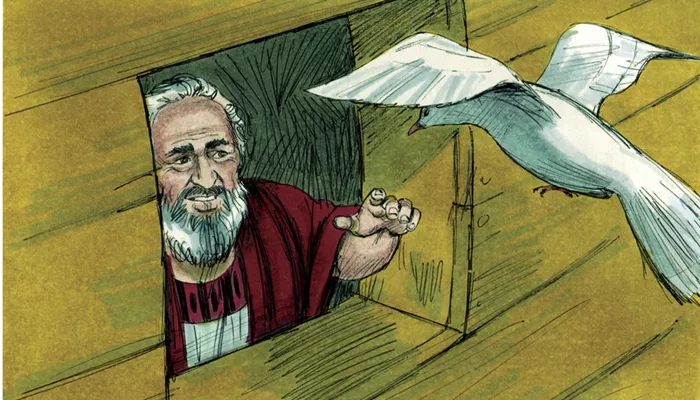Read the Daily Bible Verse Genesis 8:8 To Strengthen Your Spiritual Journey.
“Also he sent forth a dove from him, to see if the waters were abated from off the face of the ground.” – Genesis 8:8 (KJV)
Genesis 8:8 is a significant verse in the Bible, marking a pivotal moment in the narrative of Noah and the flood. This verse occurs after the great deluge that covered the earth and signifies a turning point in the story of Noah’s Ark.
The Context of Genesis 8:8
To fully understand Genesis 8:8, it’s essential to consider the broader context of the chapter and the preceding narrative. The verse falls within the post-flood account where Noah is waiting for the waters to recede after the flood that God sent to cleanse the earth of its corruption.
The Flood Narrative: Genesis 6-8 recounts the story of the flood, which was a divine judgment against a world filled with violence and sin. Noah, described as a righteous man, was instructed by God to build an ark to save himself, his family, and pairs of every kind of animal.
The Ark’s Resting Place: After the rain stopped, the ark rested on the mountains of Ararat. The waters gradually receded, but Noah waited patiently for God’s signal to leave the ark.
Noah’s Action in Genesis 8:8: Genesis 8:8 describes Noah sending out a dove to check if the waters had abated from the surface of the earth. This act was part of Noah’s cautious approach to determining when it was safe to disembark from the ark.
See also: What Does Genesis 8:7 Mean?
The Meaning of Genesis 8:8
Genesis 8:8 conveys a message about patience, trust, and the careful observation of God’s creation.
Patience and Timing: Noah’s decision to send out a dove reflects his patience and dependence on God’s timing. Despite the floodwaters beginning to recede, Noah did not act impulsively. He waited for the right moment to leave the ark, showing respect for the timing set by God.
The Dove’s Significance: The dove, as a symbol of peace and renewal, was sent to determine the state of the earth. This act signifies the beginning of a new chapter in human history, one of renewal and restoration after divine judgment.
Faith and Observation: By sending out the dove, Noah demonstrated his faith in God’s promise while also using his own senses to observe the changes in his environment. It shows the balance between divine guidance and human action.
Genesis 8:8 Application in Life
Genesis 8:8 provides several practical lessons for modern believers:
Patience in Waiting: The verse teaches the importance of patience and waiting for God’s timing. In our own lives, we are often faced with situations where waiting is required. Whether in career decisions, personal growth, or spiritual journeys, patience is a virtue that aligns with divine timing.
Trusting in God’s Plan: Noah’s actions underscore the need for trust in God’s plan. Even when circumstances seem dire, trusting that God has a purpose and a plan can help guide our decisions and actions.
Balancing Faith with Action: While Noah relied on divine assurance, he also used practical means to ascertain the situation. This teaches us to balance our faith with practical actions, ensuring that we are proactive while trusting in God’s guidance.
Comparison with Other Biblical Texts
Matthew 24:37-39: In the New Testament, Jesus refers to the days of Noah to illustrate the coming of the Son of Man. Just as people were unaware of the flood until it was too late, this passage emphasizes the need for readiness and vigilance.
Genesis 9:8-17: After the flood, God establishes a covenant with Noah, symbolized by the rainbow. This covenant is a divine promise of no more global floods, highlighting the significance of the events leading up to and including Genesis 8:8.
Psalm 104:6-9: This passage reflects on God’s control over the waters and the earth. It complements the narrative of Noah by acknowledging God’s sovereignty over creation and His power to restore it.
Modern-Day Relevance
Genesis 8:8 holds timeless relevance in several aspects of contemporary life:
Environmental Stewardship: The flood narrative underscores the importance of caring for our environment. Just as the flood was a response to corruption, modern believers are called to steward the earth responsibly and address environmental concerns.
Personal Growth and Renewal: The dove’s return signifies renewal and the start of a new beginning. In personal and spiritual growth, we often experience periods of renewal and transformation, reflecting the continuous work of God in our lives.
Crisis Management: Noah’s cautious approach can be seen as a model for handling crises. In today’s world, whether dealing with personal challenges or global issues, a careful and thoughtful approach, combined with faith, can lead to effective outcomes.
Conclusion
Genesis 8:8 is a powerful verse that encapsulates themes of patience, trust, and renewal. It provides valuable lessons for modern believers about waiting on God’s timing, balancing faith with action, and embracing renewal in our lives. The verse, when examined in its biblical and contemporary contexts, reveals a deeper understanding of God’s promises and the human response to divine intervention.
Comments on Genesis 8:8:
“Noah’s sending of the dove serves as a profound reminder of the need for patience in waiting for the right time and trusting in God’s guidance.”
“The dove, often a symbol of peace, represents hope and new beginnings, reflecting God’s promise to restore and renew the earth.”
“The practical action of sending out the dove while waiting for divine signs highlights the balance between faith and action in our spiritual journey.”
Genesis 8:8 is not just a historical account but a relevant message for today’s world, offering wisdom and insight into how we navigate our own lives and faith journeys.


